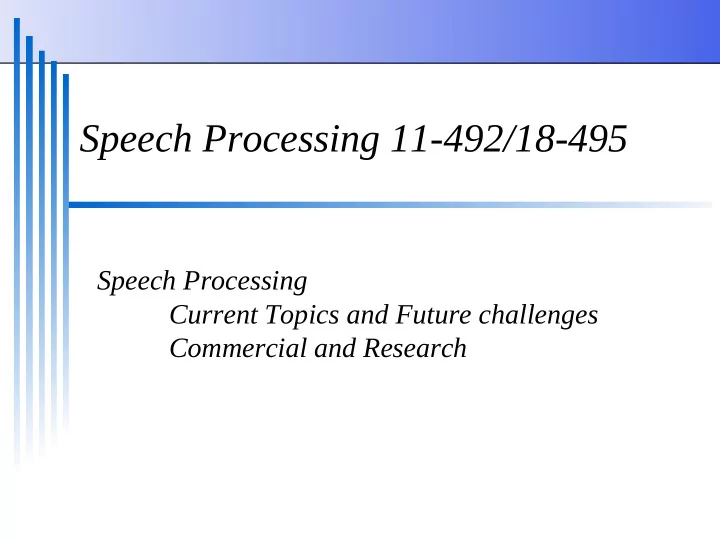

Speech Processing 11-492/18-495 Speech Processing Current Topics and Future challenges Commercial and Research
Current and Future Current and Future What are the hot topics in Speech What are the hot topics in Speech What currently works What currently works What could work soon (5-10years) What could work soon (5-10years) What are the industry hot topics What are the industry hot topics What are the research challenges What are the research challenges
Spoken Dialog: Now Spoken Dialog: Now Industry: Industry: Location based querying Location based querying On phone: Apple (Siri) On phone: Apple (Siri) In home: Amazon (Echo) In home: Amazon (Echo) Smartphones, Tablets: Smartphones, Tablets: (Owners have money) (Owners have money) – IoT deployment IoT deployment How do you make money out of this … How do you make money out of this …
Spoken Dialog: Now Spoken Dialog: Now Research Research Error recovery Error recovery Adaptive systems Adaptive systems Rapid deployment Rapid deployment Learning dialog structure from data Learning dialog structure from data Non-task oriented dialog Non-task oriented dialog
ASR: Now ASR: Now Industry Industry Adapting cloud ASR per app. Adapting cloud ASR per app. Broadcast news transcription Broadcast news transcription Robust speech recognition: Robust speech recognition: In car, outside, in noisy office, far field In car, outside, in noisy office, far field LM adaptation from other sources LM adaptation from other sources Using click through and search queries Using click through and search queries Pronunciation variants (“wrong” ones too) Pronunciation variants (“wrong” ones too) Medical transcription Medical transcription
ASR: Now ASR: Now Research: Research: Discriminative training Discriminative training Acoustic parameter projections to discriminate Acoustic parameter projections to discriminate between the correct answers and competitors between the correct answers and competitors Robust recognition Robust recognition Far field microphones Far field microphones Blind source separation Blind source separation Out of vocabulary words Out of vocabulary words Unsupervised training Unsupervised training Deep Learning (Neural Nets) Deep Learning (Neural Nets) Zero-resource ASR Zero-resource ASR
TTS: Now TTS: Now Industry Industry Building custom voices (and your voice) Building custom voices (and your voice) Multilingual on small devices Multilingual on small devices E.g. for GPS Navigation over Europe E.g. for GPS Navigation over Europe Easy methods to build new languages Easy methods to build new languages Conversational Speech Conversational Speech
TTS: Now TTS: Now Research Research Improving neural synthesis Improving neural synthesis • Quality/Resources/Runtime computation Quality/Resources/Runtime computation Rapid support in new languages Rapid support in new languages Emotional speech synthesis Emotional speech synthesis Automatic building of voices from data Automatic building of voices from data Without any human intervention Without any human intervention Languages without Orthography Languages without Orthography Synthesis beyond the sentence Synthesis beyond the sentence Synthesis with more text analysis Synthesis with more text analysis
Speech to Speech Translation Speech to Speech Translation Industry Industry One way systems, domain limited systems One way systems, domain limited systems Simple targeted cell phone systems Simple targeted cell phone systems Youtube/Broadcast translation Youtube/Broadcast translation Skype translation Skype translation Research Research Two way systems, large domains Two way systems, large domains One way lecture/broadcast news One way lecture/broadcast news
VC and SID: Now VC and SID: Now Voice conversion Voice conversion Cross Lingual Voice Conversion Cross Lingual Voice Conversion Emotion/style conversion Emotion/style conversion Conversion without training data Conversion without training data Speaker ID Speaker ID Accuracy on large data sets (> 1000 speakers) Accuracy on large data sets (> 1000 speakers) Cross channel/language ID Cross channel/language ID More information in ID (prosody, vocab) More information in ID (prosody, vocab)
CALL: Now CALL: Now Industry Industry Pronunciation training Pronunciation training Scenario practicing Scenario practicing Research Research Game based tools Game based tools Measuring educational contribution Measuring educational contribution
Speech Processing Future Speech Processing Future Hard challenges (PhD topics and beyond) Hard challenges (PhD topics and beyond) All on the research side All on the research side But maybe in Research Labs But maybe in Research Labs
Speech Reco without Speech Speech Reco without Speech Using other modalities Using other modalities Lip movement, muscle movement Lip movement, muscle movement Silent speech Silent speech No generated audio No generated audio Just think about the words Just think about the words Gesture recognition Gesture recognition Brain Computer Interfaces Brain Computer Interfaces ASR without text ASR without text Find “….” in all this audio Find “….” in all this audio
Beyond the Words Beyond the Words Recognition of more than words Recognition of more than words Intent, style, emotion Intent, style, emotion Human-Machine Human-Machine Frustration, confidence, agreement Frustration, confidence, agreement Human-Human Human-Human Rapport, relationships, persuasion Rapport, relationships, persuasion Truth and lies Truth and lies Sentiment Sentiment
Conversational Systems Conversational Systems Participant in a meeting Participant in a meeting True conversational speech True conversational speech Appropriate non-word speech generation Appropriate non-word speech generation Know when to speak, when to laugh, when to listen Know when to speak, when to laugh, when to listen Appropriate timing conversation Appropriate timing conversation Able to interrupt when having something to say Able to interrupt when having something to say Have something to say Have something to say
Summaries and Discussions Summaries and Discussions Describe a paper/movie/event Describe a paper/movie/event Appropriate summary Appropriate summary Allow questions Allow questions Know when to use style/emotion Know when to use style/emotion Not just speech<->text Not just speech<->text Understand more of the text content Understand more of the text content Answer complex questions Answer complex questions Engage user and discuss topic Engage user and discuss topic
Recommend
More recommend